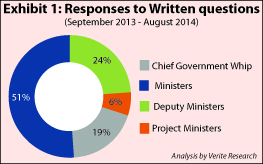News
A House bitterly divided over merits, demerits of Executive Presidency
With the growing buzz about an early Presidential election, as well as of impending crossovers, Government and Opposition lawmakers locked horns last week on the merits and demerits of the Executive Presidency (EP). The issue of corruption and abuse of authority by those in power too came in for strong criticism from the Opposition, but Government members were convinced that the criticism was brought on by frustration in seeing vast developments taking place in the country under the present administration.
While both UNP and JVP MPs were of the opinion that the EP had led to one person acting as a dictator, Prime Minister D.M. Jayaratne said that the EP is necessary to develop the country.
Leader of the Opposition and UNP leader Ranil Wickremesinghe who opened the Committee Stage debate on Monday, said that the introduction of the 18th Amendment has undermined the sovereignty of the people, and with the abolition of the Independent Commissions, Government institutions have become highly politicised.
“All police officers and secretaries of ministries were recently summoned for a meeting and asked to safeguard the government. Public officials are being told to work to ensure the government wins. The police and public servants have to protect the State, not the Government,” he said.
Prime Minister Jayaratne however, said that, it was during the time of the UNP that police personnel were sent on week-long holiday, after the elections in 1977. “Does the UNP want us to do a similar thing and send the police on leave before the polls?” he asked. The Prime Minister also said that, despite the criticism of the Executive Presidency, no Opposition party has brought proposals yet to have it abolished.
One of the sharpest attacks on the Government came from JVP Parliamentary Group Leader MP Anura Kumara Dissanayaka, who said the country was being run by a group of thugs. His speech was interrupted by angry Government legislators, which prompted Deputy Chairman of Committees, Murugesu Chandra Kumar to suspend sittings for five minuets, to restore order in the House.
“Those who want to ensure democracy must put an end to this gang of thugs who are running the country. Some are averse to criticism as much as a rat snake (garandiya) is to kerosene oil (bhoomi thel). Today the SLFP too has been hijacked by one gang, and seniors in the Party have been sidelined,” he said.
Minister of Sports Mahindananda Aluthgamage who followed the JVP MP, said that the JVP thrives by exploiting certain issues in society. “Under the leadership of President Mahinda Rajapaksa, most of our social issues have been resolved, so you have no issues to deal with,” he said.
The Minister also challenged the JVP leader to come forward to contest the Presidential election, if they can convince the people that the country is being run badly. “You can shout here, but people don’t listen to what you say,” he said.
With another two weeks to go before the Committee Stage of the Budget winds up, it is likely that similar scenes will be re-enacted in the House.
| Chief Govt. Whip point man for absconding ministers Written questions provide MPs with a vital tool with which they can ascertain information from government ministers and hold them accountable for their actions. It is therefore, essential that a minister is well prepared. Manthri.lk, through analysis of its unique Parliamentary data, has found that almost one fifth of written questions are answered by one person, Chief Govt. Whip (CGW), Dinesh Gunawardena. Bearing the heavy load: 47 of 66 Ministers and 24 of 39 Deputy Ministers have answered at least one written question over the 12-month period, September 2013-August 2014. However, CGW Gunawardena alone has responded to a staggering 19% of all written questions (Exhibit 1). Palming off of written questions: The data illustrates a significant palming off of responsibility by some ministers. Only 14 out of 141 questions (10%) answered by CGW Gunawardena are related to his duties as Minister of Water Supply and Drainage. The remaining 90% are matters in which he answers questions due to the absence of the relevant subject minister. There is, however, a significant variance in CGW Gunawardena’s involvement, depending on the topic in question (Exhibit 2). Whilst he has not had to answer a single question on Plantation Industries or Fisheries, he has answered over half the questions on Local Government and Provincial Councils. A jack-of-all-trades: The responsibility of answering written questions is vitally important. However, when the CGW has to answer these questions, he has to do so with limited knowledge of the respective ministry. This is particularly relevant when he answers undisclosed supplementary questions, which, by their very nature, require in-depth knowledge. At times, the need for the CGW’s response is essential, as seen with questions on Defence. The President does not attend Parliament to answer Defence related written questions, and there is no Deputy Minister for Defence. However, in other subject areas, especially where there are both a Minister and Deputy Minister, the reasons for palming off become less compelling. There are, however, many who have not shied away from their ministerial responsibilities. A particularly noteworthy contributor is Deputy Minister of Health, Lalith Dissanayake, who has answered 28 out of 37 questions (76%) on Health over the 12-month period. Systemic failures: Manthri.lk has previously uncovered the few ‘gladiators’ within the Opposition, who made use of procedural frailties to flood the system with written questions. The over-reliance on the CGW is a further illustration of a systemic failure in holding the government accountable. Are some Ministers and Deputy Ministers not stepping up to the plate? Or does the workload of the CGW align with expectations? Your thoughts and questions are welcome at
|



